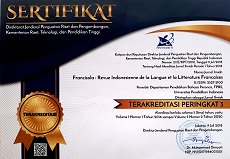L’écriture de soi chez Malika Mokeddem : libération ou engagement ?
Abstract
RÉSUMÉ Le présent travail étudie l’écriture de soi dans les deux œuvres de Malika Mokeddem : Mes hommes et je dois tout à ton oubli. Il s’agit particulièrement d’interroger le projet autobiographique dans Mes hommes et la coïncidence du réel et du fictionnel dans Je dois tout à ton oubli, afin d’appréhender la connexité tissée dans ces deux romans. Notre étude est étayée par deux concepts théoriques de l’écriture de soi à savoir : l’autobiographe et l’autofiction. Sur le plan méthodologique, il sera question d’examiner plusieurs éléments qui font basculer le récit entre référentialité et fictionnalité. Lesquels éléments sont, d’une part, d’ordre narratif, ils révèlent la stratégie d’écriture chez M. Mokeddem. D’autre part, d’ordre thématique qui couvrent les objectifs de l’écriture de soi. Conséquemment, l’écriture de soi chez M. Mokeddem puise sa particularité à la fois des procédés usités et du réseau de significations qui relie les deux romans.
Mots- clés : autobiographie, autofiction, énonciation, thèmes et objectifs, indices paratextuels.
ABSTRACT. This research paper attempts to expose self writing in thetwo works of Malika Mokeddem My Men and I Owe Everything to Your forgetfulness . This study is particularly about questioning the autobiographical project in My Men and the fact and the fictional in I Owe Everything to Your forgetfulness and that to comprehend the connectedness woven in these two novels. Our study will be grounded on two theoritical concepts of self writing: the autobiography and the autofiction. From a methodological point of view, it will be a question of examining several elements that swing texts between referentiality and functionality. These elements are on one hand narrative; they reveal the writing strategy of M Mokeddem. On the other hand, that of the thematic order which covers the objectives of self writing. Consequently, Mokeddem 's self writing draws its particularity from both the commonly used processes and the network of meanings which link the two novels.
Keywords: autobiography, autofiction, enunciation, themes and objectives, Paratextual indices
Full Text:
PDFReferences
Achour, C.C. (2007). Malika Mokeddem, Métissage. Blida : Editions du Tell
Bordas, E., Barel-Moison, C. Bonnet, G. et Déruelle, A. (2015). L’analyse littéraire, Paris : Armand colin
Derrais. B, S. (2011). Malika Mokeddem, La désirante. L’ivrEscQ. 14, 18-21.
Freud, S. (1983). Le délire et le rêve dans Gardiva de W. Jensen (1907). Paris: P.U.F
Gasparini. P. (2004). Est-il-je ? Roman autobiographique et autofiction. Paris : Seuil
Genette. G. (1987). Seuils. Paris : Editions du Seuil
Helm, Y-A. (dir.). (2000). Malika Mokeddem : Envers et contre tout. Paris : L’Harmattan
Labter, L. (2007). Malika Mokeddem, entretien avec Lazhari Labter. Malika Mokeddem, à part, entière. Alger : Editions Sedia
Lafitte, J., Lafitte, J.Baraquin. Bontemps, J et Touchefeu, Y. (1996). L’écriture de soi. Courty : Prépas scientifiques
Lejeune, P. (1975). Le pacte autobiographique. Paris : Seuil
Maingueneau, D. (1993). Elément de linguistique pour le texte littéraire. Paris : Dunod
Miraux, Jean-Philippe. (2002). L’autobiographie. Écriture de soi et sincérité. Paris : Armand Colin
Mokeddem, M. (2005). Mes hommes. Paris : Grasset
Mokeddem, M. (2008). Je dois tout à ton oubli. Paris : Grasset
Younsi, Y. (2006). Interview exclusive Malika Mokeddem, L’état algérien m’a censuré, Le soir d’Algérie, p 25. Repéré à Http://www.lesoirdalgerie.com/articles/2006/09/12/article.php?sid=42967&cid=16
DOI: https://doi.org/10.17509/francisola.v3i1.11892
Refbacks
- There are currently no refbacks.
Copyright (c) 2018 FRANCISOLA

This work is licensed under a Creative Commons Attribution-ShareAlike 4.0 International License.
Statcounter View My Stats










